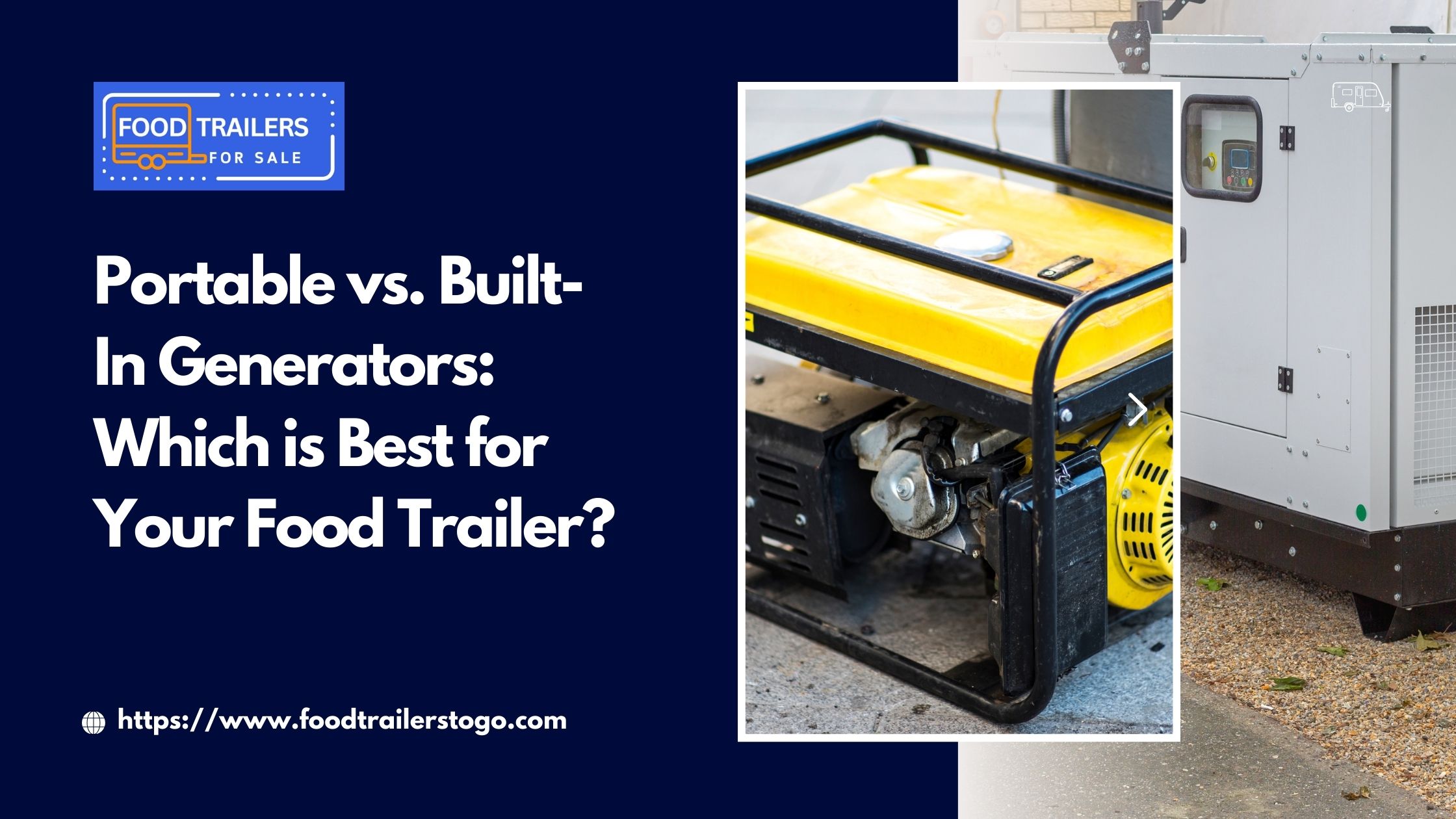When setting up a food trailer or food truck, one of the most important decisions you’ll face is choosing the right generator. Whether you’re starting a new food trailer business or upgrading your existing setup, understanding the pros and cons of portable vs. built-in generators can significantly impact your operations. These generators power everything from cooking equipment to lighting, and making the right choice is essential for both efficiency and profitability. But how do you determine which is the best option for your food trailer?
In this article, we’ll compare portable vs. built-in generators, highlighting their key differences, advantages, and disadvantages. By the end, you’ll be equipped with the knowledge to make an informed decision on which type of generator will best suit your specific needs and help your business thrive.
Why Choose a Generator for Your Food Trailer?
Before diving into the details of portable vs. built-in generators, it’s crucial to understand why a generator is essential for your food trailer.
Food trailers and food trucks provide unmatched freedom and flexibility for entrepreneurs. They allow food vendors to operate in various locations, festivals, and events, providing customers with fresh, delicious meals on the go. However, this mobility often means that access to reliable electricity is limited. A generator becomes the backbone of your food trailer, ensuring your appliances, cooking equipment, and lighting run smoothly.
Without the right power source, your food trailer business could face operational setbacks, hindering your ability to serve customers efficiently. Therefore, investing in a high-quality generator is crucial for keeping your business running smoothly.
Portable vs. Built-In Generators: A Clear Comparison
1. Portable Generators: Flexibility and Versatility
A portable generator is a self-contained unit that you can move easily. These generators are typically smaller and designed to be transported from one place to another, offering significant flexibility.
Advantages of Portable Generators
- Easy to Transport: The main advantage of a portable generator is its mobility. You can easily transport it to different locations, making it perfect for food trucks or trailers that need power in diverse environments.
- Cost-Effective: Portable generators tend to be more affordable compared to built-in systems. If you’re just starting your food trailer business or on a tight budget, a portable generator can provide the power you need without breaking the bank.
- Quick Setup: These generators are relatively easy to set up. With no installation required, you can be up and running in minutes. This makes it ideal for food trailers that frequently move to different locations.
Disadvantages of Portable Generators
- Noise: One of the major drawbacks of portable generators is the noise. They can be loud, which might disturb your customers or violate local noise ordinances, especially in a quiet setting.
- Limited Power Supply: While portable generators are versatile, they may not have the capacity to handle heavy-duty appliances in larger food trailers.
- Fuel Dependency: These generators rely on fuel (gasoline or propane), which means you’ll need to regularly refuel them. This can add to operational costs and requires regular maintenance.
2. Built-In Generators: Seamless Integration and Power
A built-in generator is permanently installed within your food trailer, providing a more integrated power solution. These generators are typically more robust and designed to handle larger power requirements.
Advantages of Built-In Generators
- Higher Power Output: Built-in generators are designed to provide a constant and more reliable power source, often with higher wattage. They can power multiple appliances at once without risk of overload, making them ideal for food trailers with heavy-duty cooking equipment.
- Less Noise: Since built-in generators are housed inside the trailer, they often operate more quietly than their portable counterparts. This can enhance the customer experience by reducing noise pollution.
- Convenient Fuel Management: Built-in generators typically run on the same fuel source as the vehicle, which means you don’t have to worry about separate fuel management or refueling frequently.
Disadvantages of Built-In Generators
- Higher Initial Cost: Built-in generators are generally more expensive, both in terms of the unit and installation. If you’re on a tight budget, this might not be the best option initially.
- Space and Installation: These generators require professional installation, which could add to your setup time and costs. Additionally, they take up valuable space within your food trailer.
- Limited Mobility: Unlike portable generators, built-in generators limit the mobility of your food trailer. If you need to relocate or adjust the layout of your trailer, you’ll be stuck with the generator’s location.
Key Considerations for Choosing the Right Generator for Your Food Trailer
When deciding between portable vs. built-in generators, several factors will play a role in determining which is best for your specific needs:
1. Power Requirements
Consider the type of equipment you use in your food trailer. Do you have large appliances like ovens, refrigerators, or fryers? If so, a built-in generator might be the better choice due to its higher power output. Smaller operations with less demanding equipment can often get by with a portable generator.
2. Budget
For food trailer businesses on a tight budget, portable generators are more affordable and cost-effective. Built-in generators come with a higher price tag due to installation and the unit itself. Be sure to factor in both the upfront costs and long-term maintenance when making your decision.
3. Mobility and Flexibility
If you plan on moving your food trailer frequently to different locations, a portable generator offers superior mobility. On the other hand, if your trailer stays at a fixed location, a built-in generator may be a more convenient option.
4. Noise Concerns
If you’re operating in a noise-sensitive area or want to provide a quieter environment for your customers, a built-in generator is typically the better choice. Portable generators can be noisy, which could negatively affect your business if you’re located in a residential or peaceful area.
5. Fuel Efficiency
Fuel management is an essential consideration. Built-in generators often share the fuel system with the trailer’s engine, making refueling simpler. Portable generators require separate refueling and maintenance, which can become tedious over time.
Portable vs. Built-In Generators: Comparison Table
| Feature | Portable Generator | Built-In Generator |
|---|---|---|
| Power Output | Lower wattage, ideal for smaller trailers | Higher wattage, ideal for larger trailers |
| Noise Level | Generally louder, can cause disturbance | Quieter operation, better for customer experience |
| Mobility | Highly portable, easy to transport | Less mobility, fixed location in the trailer |
| Cost | More affordable | Higher upfront cost, including installation |
| Fuel Management | Requires separate fuel management | Runs off the trailer’s fuel system |
| Installation | No installation required | Requires professional installation |
FAQs About Portable vs. Built-In Generators
1. Can a portable generator power a large food trailer?
Yes, a portable generator can power a small to medium-sized food trailer. However, larger trailers with heavy-duty equipment may require a built-in generator for consistent and reliable power.
2. How long can I run a portable generator for my food trailer?
The runtime of a portable generator depends on the size of the fuel tank and the load it’s powering. Typically, a full tank of fuel can last anywhere from 6 to 12 hours.
3. Is a built-in generator worth the investment?
If your food trailer is used frequently and requires heavy-duty equipment, a built-in generator can provide long-term benefits, including reduced noise and reliable power. However, it does come with a higher initial cost.
4. Can I install a built-in generator myself?
No, built-in generators require professional installation to ensure proper integration and safety. It’s important to hire a qualified technician for the installation process.
5. What maintenance is required for each type of generator?
Both portable and built-in generators require regular maintenance, including oil changes, fuel system checks, and cleaning. Built-in generators may need less frequent attention since they’re more integrated with the trailer’s system.
6. Are portable generators quieter than built-in generators?
No, built-in generators are generally quieter because they are housed inside the trailer, while portable generators are open and may produce more noise.
Conclusion: Which Generator is Right for Your Food Trailer?
When deciding between portable vs. built-in generators, it ultimately depends on your unique needs and the type of food trailer business you operate. If you prioritize flexibility, lower initial costs, and mobility, a portable generator might be your best choice. However, if you have a larger operation requiring higher power capacity and quieter operation, a built-in generator offers a more permanent, reliable solution.
At Food Trailers to Go, we specialize in custom-built food trailers tailored to your specific needs. Whether you’re opting for a portable generator or a built-in generator, we can help ensure that your food trailer is equipped with the best possible setup to keep your business running smoothly.
Explore your options and choose the generator that best suits your needs to ensure uninterrupted service and success in your food trailer business.

